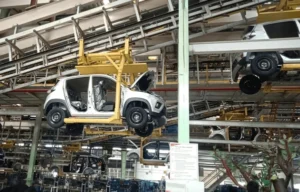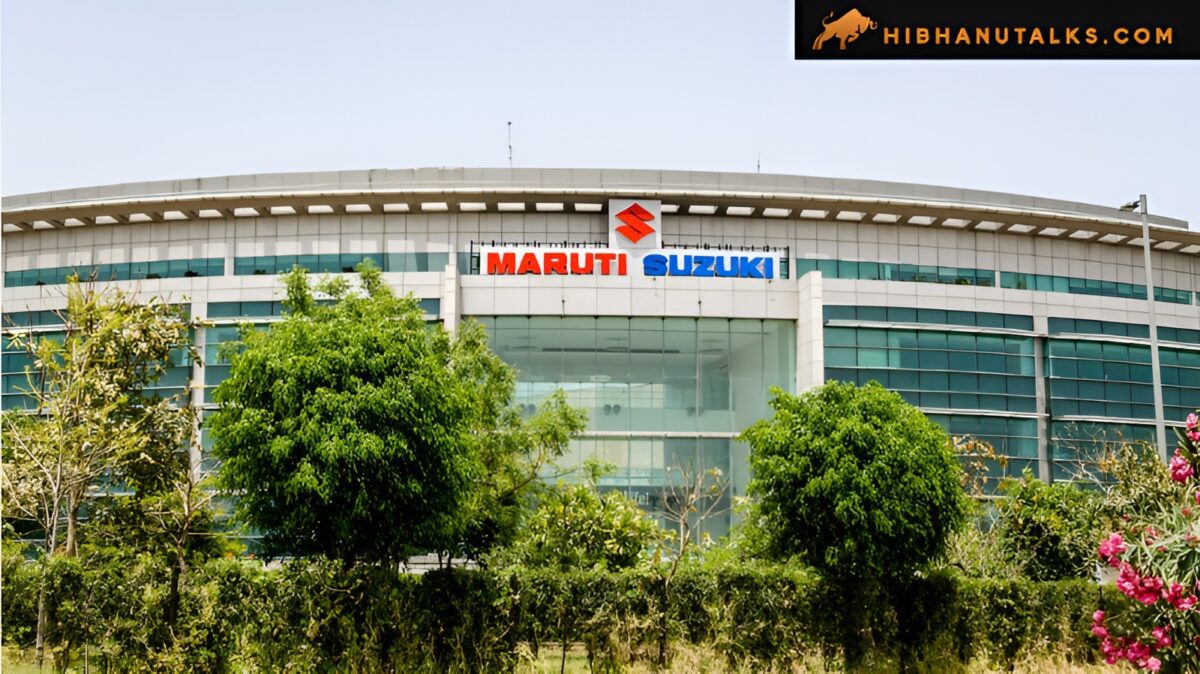
Maruti Suzuki’s 1 Crore Milestone at Manesar: The Biggest Shift in Indian Auto Manufacturing?
Contents
- 1 Maruti Suzuki Manesar plant
- 1.1 Maruti Suzuki’s 1 Crore Milestone at Manesar: The Biggest Shift in Indian Auto Manufacturing?
- 1.1.1 The Powerhouse of Production: Versatile and Scalable
- 1.1.2 Self-Reliance on Wheels: Local Manufacturing Leads the Way
- 1.1.3 Efficient and Effective: High-Quality Exports from Manesar
- 1.1.4 Gratitude on the Assembly Line: A Message from Maruti Suzuki’s CEO
- 1.1.5 Looking Forward: What’s Next for Maruti Suzuki’s Manesar Facility?
- 1.1.6 Conclusion:
- 1.1.7 FAQs:
- 1.1.7.1 1.When did Maruti Suzuki’s Manesar plant begin operations?
- 1.1.7.2 2.How many vehicles has the Manesar plant produced as of October 2024?
- 1.1.7.3 3.Which models are produced at the Manesar facility?
- 1.1.7.4 4.What is the production capacity of the Manesar plant?
- 1.1.7.5 5.Does the Manesar plant contribute to exports?
- 1.1.7.6 6.How has the Manesar plant contributed to employment?
- 1.1.7.7 7.What is Maruti Suzuki’s approach to local manufacturing?
- 1.1.7.8 8.What role does the Manesar plant play in Maruti Suzuki’s global presence?
- 1.1.7.9 9.What was the first car exported from Manesar to Japan?
- 1.1.7.10 10.What is Maruti Suzuki’s future plan for the Manesar facility?
- 1.2 Maruti Suzuki Manesar plant
- 1.3 Railtel Shares Surge 10% After Securing Rs 79.8 Crore MHADA Contract: Growth on the Horizon
- 1.1 Maruti Suzuki’s 1 Crore Milestone at Manesar: The Biggest Shift in Indian Auto Manufacturing?
Maruti Suzuki Manesar plant
Maruti Suzuki’s 1 Crore Milestone at Manesar: The Biggest Shift in Indian Auto Manufacturing?
In a remarkable achievement, Maruti Suzuki’s Manesar facility has produced its 1 croreth vehicle, cementing its position as one of Suzuki’s fastest-growing global manufacturing plants. Starting operations in October 2006, this plant has not only revolutionized Maruti Suzuki’s production capabilities but has also significantly boosted the company’s global footprint.
Eighteen years later, in October 2024, this facility continues to set benchmarks, contributing to Maruti Suzuki’s cumulative production of over 3.11 crore vehicles. This extraordinary milestone demonstrates Maruti’s relentless pursuit of innovation, production excellence, and market leadership.


The Powerhouse of Production: Versatile and Scalable
Spread across 600 acres, the Manesar plant plays a critical role in Maruti Suzuki’s dominance in the Indian automotive sector. The facility produces several of the brand’s best-selling models, including the Brezza, Ertiga, XL6, Ciaz, Dzire, Wagon R, S-Presso, and Celerio. The versatility of the plant, with its annual capacity to produce 2.35 million units, reflects Maruti Suzuki’s ability to meet diverse market demands, both in India and globally.
Self-Reliance on Wheels: Local Manufacturing Leads the Way
The success of the Manesar plant isn’t just about numbers; it’s a testament to the importance of local manufacturing in India. The facility prides itself on a robust local supply chain, enhancing Maruti Suzuki’s self-reliance. This focus on local sourcing ensures that production is competitive and high-quality, while contributing to the country’s economic growth.
The emphasis on local manufacturing has allowed Maruti Suzuki to maintain global production standards, an essential factor for the company’s success in domestic and international markets. The plant has also played a key role in generating employment, providing thousands of direct and indirect job opportunities in various stages of production, quality control, and supply chain management.
Moreover, the vast network of suppliers and ancillary industries surrounding the Manesar facility has further contributed to large-scale employment, creating a ripple effect in the local economy.


Efficient and Effective: High-Quality Exports from Manesar
The Manesar plant isn’t just about fulfilling domestic demand—it’s also a global export powerhouse. Vehicles produced here are shipped to markets across Latin America, the Middle East, Africa, and neighboring Asian countries, showcasing Maruti Suzuki’s competitive edge on the international stage. The Baleno, which became the first Indian passenger car to be exported to Japan, is a prime example of the plant’s capabilities to meet and exceed global market expectations.
By balancing domestic needs with growing export potential, Maruti Suzuki has created a strategic production model that drives growth and strengthens its position as a global leader. Maruti Suzuki Manesar plant, The manufacturing processes at Manesar remain both efficient and cost-effective, ensuring that high-quality vehicles are produced while maintaining competitive pricing.


Gratitude on the Assembly Line: A Message from Maruti Suzuki’s CEO
Achieving the 1 crore production milestone isn’t just a reflection of the plant’s capabilities—it symbolizes Maruti Suzuki’s unwavering commitment to advancing automotive manufacturing in India. Continuous upgrades, stringent production standards, and a focus on adapting to technological advancements have allowed the Manesar facility to stay ahead in a rapidly changing automotive landscape.
Hisashi Takeuchi, Managing Director & CEO of Maruti Suzuki India Limited, expressed his gratitude, stating, “As we reach this important landmark, I thank our customers for placing their trust in us. I also extend my gratitude to all our employees, business associates, and the Government of India for their continued support.” This milestone marks not just a numerical achievement but a promise of continued innovation and quality in the years to come.


Looking Forward: What’s Next for Maruti Suzuki’s Manesar Facility?
The journey doesn’t stop at 1 crore vehicles. As the automotive industry continues to evolve, with shifts toward electric vehicles (EVs) and sustainability, the Manesar facility is well-positioned to adapt to these changes. The ability to integrate new technologies, advanced manufacturing processes, and innovative design into its operations ensures that the plant remains a key player in both the Indian and global automotive markets.
With a focus on continuous improvement and sustainable production, the future looks bright for Maruti Suzuki’s Manesar plant as it continues to break records and set new standards in the industry.


Conclusion:
Maruti Suzuki’s Manesar facility hitting the 1 crore vehicle production mark is a testament to its leadership in the Indian automotive market and its growing global influence. By maintaining a strong focus on local manufacturing, job creation, and quality production, the plant is not only shaping the future of Maruti Suzuki but also contributing significantly to the Indian economy. Maruti Suzuki Manesar plant, With future plans to integrate new technologies and sustainability, Manesar remains a cornerstone of Maruti Suzuki’s success story.
FAQs:
1.When did Maruti Suzuki’s Manesar plant begin operations?
A. The Manesar facility started production in October 2006.
2.How many vehicles has the Manesar plant produced as of October 2024?
A. The plant has produced 1 crore vehicles by October 2024.
3.Which models are produced at the Manesar facility?
A. Popular models such as Brezza, Ertiga, XL6, Ciaz, Dzire, Wagon R, S-Presso, and Celerio are produced at the plant.
4.What is the production capacity of the Manesar plant?
A. The plant has an annual production capacity of around 2.35 million units.
5.Does the Manesar plant contribute to exports?
A. Yes, vehicles produced at Manesar are exported to markets in Latin America, the Middle East, Africa, and Asia.
6.How has the Manesar plant contributed to employment?
A. The facility has generated both direct and indirect job opportunities, supporting local employment.
7.What is Maruti Suzuki’s approach to local manufacturing?
A. Maruti Suzuki emphasizes self-reliance by maintaining a robust local supply chain, ensuring competitiveness and high quality.
8.What role does the Manesar plant play in Maruti Suzuki’s global presence?
A. The plant supports Maruti Suzuki’s global competitiveness by producing export-quality vehicles and fulfilling international demand.
9.What was the first car exported from Manesar to Japan?
A. The Baleno was the first passenger car from Manesar to be exported to Japan.
10.What is Maruti Suzuki’s future plan for the Manesar facility?
A. Maruti Suzuki plans to integrate new technologies and adapt to market changes, ensuring the facility stays competitive in the evolving automotive landscape.
Maruti Suzuki Manesar plant





















Post Comment